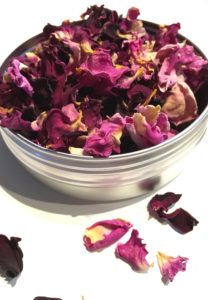Rose Petals are popular with home cooks and professional chefs alike. While the petals provide only small amounts of nutrition, they do add benefits for you beyond their actual food value.
Contents
Uses
- Suitable for medicinal purposes and for culinary adventures.
Benefits
- Because petals contain about 95 percent water, their nutritional value is limited and their calorie count is low. However, the petals do contain some vitamin C, though less than that found in rose hips, the fruit of the rose that appears after the flowers drop.
- Ancient Chinese medicine used roses to treat digestive disorders, the pain from injuries and menstrual irregularities.
- Adding rose petals to your repertoire allows you to explore new cuisines. Middle Eastern cuisine, for instance, uses rose water and rose petals in a variety of dishes. Try Persian stuffed dumpling squash with rose petals from Epicurious.com or Moroccan peaches from the Rhode Island Rose Society, listed in the Resources section.
- The rose is sensual, evocative, and evokes the spirit of love in the heart and mind. Rose is a classic aphrodisiac because it affects both mind and body in a synergistic fashion. The scent of roses can reach within to lift depressive moods and create a feeling of well being and mild euphoria.
Cautions
- n/a
Interactions
n/a
Other names
Rosa damascena, Rosa centifolia
References
Source: LiveStrong, http://www.livestrong.com/article/412805-what-are-the-benefits-of-eating-rose-petals/
Anniesremedy, https://www.anniesremedy.com/rosa-spp-rose.php
Image source: http://maddocksfarmorganics.co.uk/edible-flowers/dried-edible-rose-petals/

